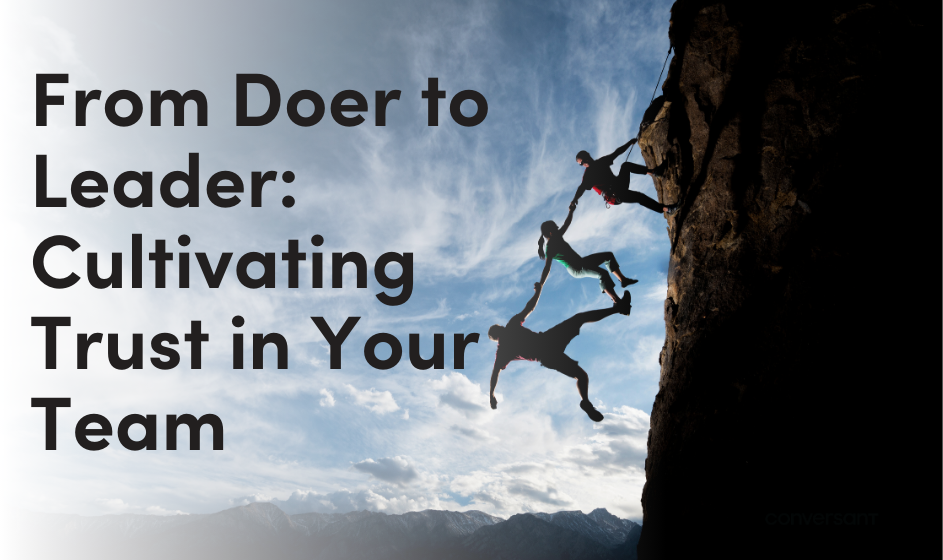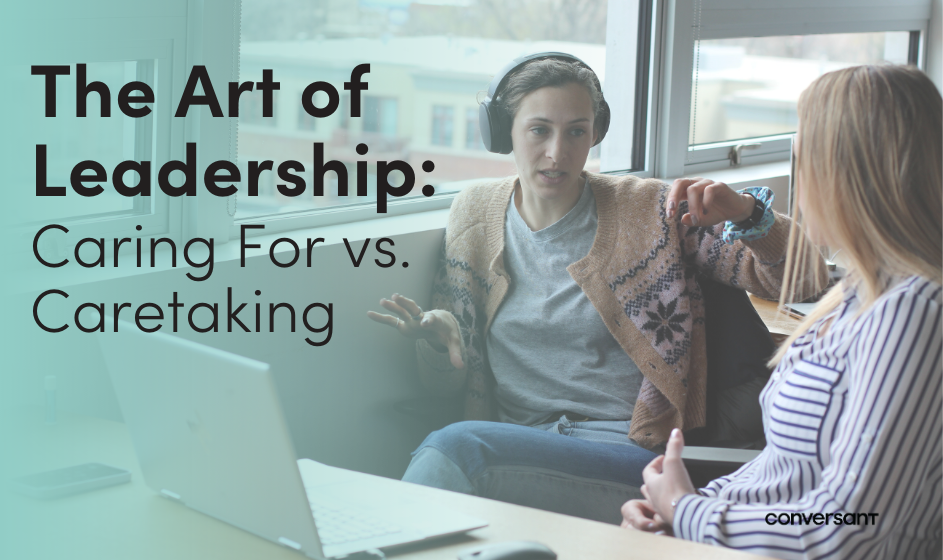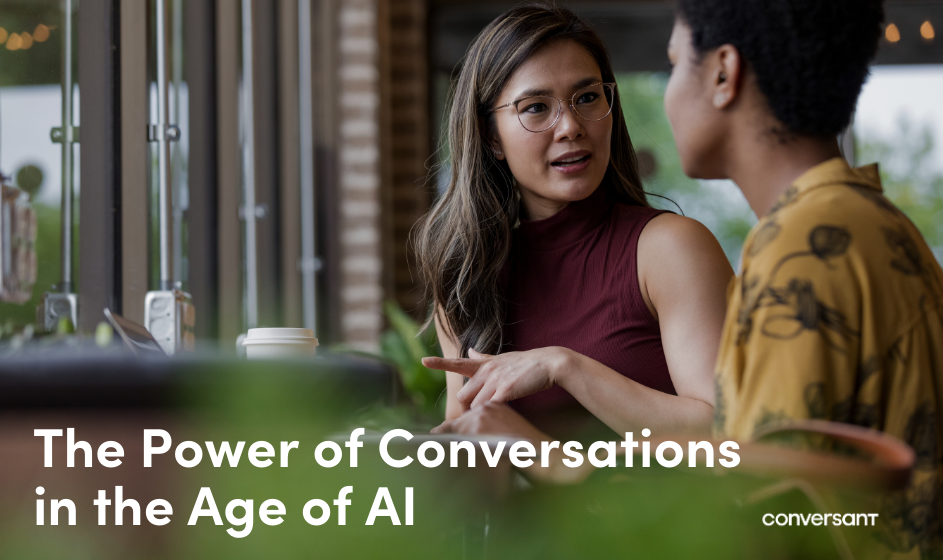In today’s episode, Mickey is joined by senior Conversant consultant, Robin Anselmi, to discuss the importance apology plays within the realm of leadership, as well as how to gracefully execute an apology rather than bastardize it. Because humans are innately imperfect, as Robin points out, apologies will be necessary, and they need to happen in a way that offers connection and learning. Mickey and Robin lay out the anatomy of an apology that a connected leader should strive for and discuss the opportunities for growth available to individuals and businesses that adopt this model.
Highlights
- Apologies are inevitable, because humans are fallible. You might as well learn to get good at saying them, because they will happen.
- The anatomy of an apology from a place of connection consists of a genuine and specific acknowledgement of what happened, a responsible promise to correct the mistake and a request for forgiveness.
- Apology and forgiveness are inextricably linked. If you’re not receiving the forgiveness you want, first examine the quality of your own apology.
- Illegitimate apologies shift blame; well-executed apologies take ownership of being in something together.
- If your idea of an “apology” is finding someone who you say is worse than you are to turn attention away from you, you’re bastardizing the collective opportunity for learning and moving forward.
- Rather than evading apologies, why not approach them as openings for conversation, tools for understanding and the roadmap for next steps?
The Strength of a Well-Executed Apology
0:45 Mickey: We have with us Robin Anselmi, a senior member of Conversant, a trusted colleague and someone I admire in the way she thinks and the way she acts. Robin’s background is in engineering, at Corning and Capital One, where she provided leadership before she came to us.
We love having someone with that technical design who also has a respect for the design of human connection.
1:27 Robin Anselmi: I love being in conversation about the design of human beings and how we work together, and I always love being in conversation with you, so this is a pleasure to spend my afternoon this way.
1:59 Robin: I’ve been thinking about the role of apology when it comes to leaders. Some use apology from a place of leadership and some do it as bastards.
2:25 Robin: Right around now, for those of us who are in the United States, there has been a lot in our media of bad role modeling on what an apology actually looks like.
“I’m sorry if my words offended someone,” is not an actual apology.

12:47 Robin: A lot of leaders think that is an apology, that it comes from a position of strength, but it actually causes way more harm than good in our politics, our families and organizations.
Correction, Not Perfection
2:59 Mickey: Given that you and I both care deeply about how the quality of connection affects the way organizations perform, what do you think apology has to do with that?
3:30 Robin: The last time I checked, none of us were walking around perfect on this earth.
We often say that conversation is the art of correction, not perfection. That’s also true in leadership.
3:55 Robin: For any individual, team or organization to expect to be perfect sets us up for grave disappointment, and it sets up an environment where it’s really hard to raise and resolve issues.
4:18 Mickey: As you and I know, often these things we know to be inevitable about humans, we still try to design our organizations without taking that into account.
One of the things that is inevitable about humans is we are going to have aspirations that we do not always stay true to, we will have values we don’t always adhere to and we’re going to have ambitions that don’t always succeed.
4:48 Mickey: One of the things we can absolutely guarantee are occasional bouts of disappointment, so apologies make sense.
Apologies Should Not Be a Welcome Surprise—But They Are
5:01 Mickey: You’ve worked in so many organizations and you’ve been an organizational leader yourself. What’s an example of the kind of thing that happens that has you think apology is an issue for leadership?
5:20 Robin: I had done some work alongside an insurance company, and in one of their divisions, they had been doing an upgrade to one of their technical platforms that had involved a large number of people putting in a lot of extra hours. It had not gone well.
5:47 Robin: I was on-site one day when the COO and CTO of that division had an all-staff meeting with 100 people and they said, “We apologize. We got into this without knowing all of the ramifications. We did not predict that it could have gone this way and we did not give you the resources you needed to be successful.”
That entire organization was abuzz that these two gentleman stood up, took responsibility and they didn’t blame on anyone else. I can’t tell you how many people came up to me and said, “We’ve never had anyone do that here before.
6:28 Robin: In an organization that had so many problems over a long period of time, those two people were held in extremely high regard. And the regard for them went up as a result of those words: “I am sorry.”
6:48 Mickey: The fact that they were specific about the consequences of the people they were talking to was particularly important. They said, “We did not give you the resources you needed to succeed.”
The Three Components of a Well-Received Apology
7:06 Mickey: When it comes to the nature of apology, there are a few things that have been on my mind since you mentioned this earlier. Apology is inevitable, like you were talking about earlier. There are times when our best intentions are going to go unachieved, so we might as well get good at it since it is inevitable.
If you’re looking at the domain of leader, apology starts with a genuine and specific acknowledgement of what you did or didn’t do that caused a problem, who was harmed, and how.
7:54 Mickey: Specifics are really important, because if you make an apology generic, it doesn’t land. It occurs to people as inauthentic. It’s pretty obvious to people when someone is saying the words but they’re not standing behind the words they’re saying.
8:27 Mickey: After the genuine and specific acknowledgement, there’s a responsible promise to correct. There were consequences for what went wrong. Like your example: “What resources do we need to provide to whom, by when?” The promise is how people take the apology seriously because you’re actually responsible for the mistake. If you don’t do that, the apology comes out hollow.
9:12 Mickey: Lastly—very few people do this—you request forgiveness. You look at the people who were involved and you say, “Please tell me, if I keep the promise I just made, is that enough for us to be back on track? Will you please forgive this mistake so we can move on together?”
9:40 Mickey: You ask that not only of the people who were damaged but everybody who witnessed the damage. You’re taking care of a network of relationships, not just the people who might have been hurt.
9:56 Mickey: And then, of course, you have to actually go keep the promises. If you go out and execute, then usually things get right back on track.
It’s not an accident that some of the most famous and enduring stories in the history of humankind are redemption stories.
10:53 Mickey: People really do want to have us own up to mistakes and move on. Not apologizing wholeheartedly and genuinely causes a deep disease of disconnection.
11:03 Robin: I love the three components you just put together. That specificity provides plausibility. It shows it’s plausible that you are sorry for what happened. Too often our apologies come across as superficial or as a way to get out of a particular situation.
11:36 Robin: Making a promise is recognizing that you have contributed to the mistake. If you say, “I’m sorry you feel that way,” it doesn’t recognize your contribution to the situation.
The request for forgiveness is a way of re-forging the community. It’s all of us in something together.
The Connection of Apology and Forgiveness
12:22 Mickey: Apology and forgiveness are so connected. I think of them like my eyeglass lenses—concave on one side and convex on the other. You can’t separate one from the other.
12:40 Mickey: I have a lot of experience with hearing complaints: “People just won’t forgive and forget. They won’t just move on.” Well, I wonder if that’s somehow related to the quality of your apology…
The real bastards are introspectively impotent. They don’t see that the lack of forgiveness they’re receiving is related to their own conduct.
13:10 Robin: The lack of the apology in an organization sets up a mood of people being afraid to fail and try things out on the edge or, maybe even more dangerously, afraid to talk about failure.
13:33 Robin: That’s how we wind up with cover-ups in organizations. People can’t raise an issue of something that hasn’t gone as planned. Leader who apologize create way more transparency in the entire organization.
13:55 Robin: We hear that word over and over again: “Is the organization transparent enough?” Are you as a leader setting up a mood that allows for transparency?
If you haven’t modeled apology or forgiveness yourself, how can you expect others around you to do it?
14:14 Mickey: You just reminded me of a documentary I saw years ago called “Long Night’s Journey Into Today,” about the South African reconciliation putting the country back together after apartheid. In the documentary, there are two different policemen who are asking for clemency from the reconciliation commission. They had proven to be a part of the deaths of seven young men.
14:58 Mickey: One of the policemen got no interest in clemency for how he handled himself, only justifying what happened. The other one was deeply and emotionally feeling the damage that he’d caused. It was extraordinary how his remorse hit the same group of people who rejected the first policeman but supported the second. There are other examples in that film where people were forgiven and caused that kind of connectivity is re-strengthened. And examples of ways people conducted themselves in a way that the community was weakened.
15:50 Mickey: When you’re recovering from death, that takes a lot of forgiveness. But there are people who have been powerfully apologetic, responsible, honorable who evoke that kind of forgiveness.
Bastardizing the Apology
16:03 Mickey: I want to go back to the notion of bastards. What do you think is going on when someone is really, wickedly bad at apology and the way they handle it hurts the community instead of helping it?
16:15 Robin: The biggest problem is they do not recognize their own contribution. “I’m sorry you feel that way” or “I’m sorry if people were offended,” are probably some of the most damaging apologies someone can make. It’s a false apology.
Shifting the blame back on someone else is a bastard move to make, because you’re not owning that we’re in something together.
16:43 Mickey: It’s funny that you said “bastard move to make.” It is an illegitimate apology.
17:06 Mickey: Especially during the 2016 presidential campaign this year, one of the things I’ve gotten hypersensitive to is all of the times in our lives that we see this achingly bad version of apology: where people think, “I can say I’m sorry, then find someone who I say is worse than me and somehow identifying that villain makes me a hero.”
17:36 Mickey: How do you work that out, rationally? If there’s enough blame on someone else, somehow my behavior is permitted.
It’s like they never got that lesson our mothers told us so young that “two wrongs don’t make a right.”
17:54 Mickey: The rampant irresponsibility that comes to mind is startling. The complaints that you might hear from someone who is making weak apologies that have not been well received might have people on his side who ask, “What happened to forgiveness? What happened to forgive and forget?”
18:29 Mickey: I don’t think they realize that this person is getting a response befitting of the way they’re operating. It’s not, “I said I’m sorry; what’s wrong with all you people?!” Go back and examine yourself before you complain about anyone else. When forgiveness happens, it’s important to realize that forgiveness is not approval.
Forgiveness is the desire to redeem the past by learning from it and starting over.
19:09 Mickey: The way people interact with us after we make mistakes either calls us to learn and move forward…or not. I know I have dearly needed people to forgive me. I’ve had to learn the hard way that some of my apologies have been irresponsible, blame-filled, justifying, veiled attempts to evade. I’m glad I have people like you around me to not let me get away with that anymore.
19:58 Robin: To be fair, we need each other in that. If we see apology as a way to learn and move forward, does that really change the way we think to approach it? What if apology is really a way to hold up the mistakes we’ve made so we can learn from them as a community and figure out the way to heal and move forward?
20:37 Robin: The apologies that go really badly, we don’t have that opportunity to learn either individually or collectively. There’s no learning in what they care about or what we care about. There’s no way to move forward.
21:03 Mickey: That’s a beautiful summary of the challenge: apology is where things go wrong. We’ve made mistakes, some wittingly, some unwittingly. We’ve caused damage. Take responsibility for it and invite people into a conversation about what we can learn and what I can do to get back on the road to doing things we want to see happen.
Then apology is just an occasion for us to reconnect, recommit and go make some good things occur.
21:35 Mickey: I just would like to see people be wholehearted in their apologies, more conscious of this tendency we have to be right and make others wrong and to have an apology yield to that desire to blame. Just accept it, learn from it, fix it and ask for people to forgive.
22:14 Robin: This is the exploration of what it means to be human together. Like I said at the start, being human means none of us are perfect, so learning how to apologize better serves all of us.



